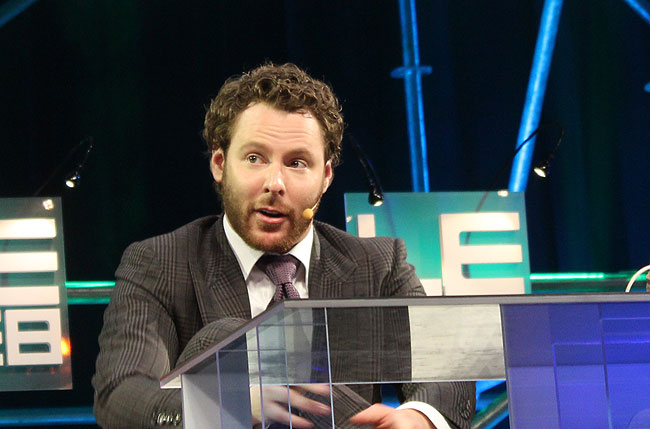We all have them. Those apps we open without thinking. Not because we need anything in particular, but because they feel… safe, in some…
Too many VCs, not enough good entrepreneurs: Sean Parker
Billionaire internet investor Sean Parker took the stage in Paris at LeWeb with a simple message for his audience: There are “too many venture capitalists in the world and not enough entrepreneurs”. Parker has a CV that would blow the mind of most people. He was co-founder of that great music industry disrupter Napster, and more recently an investor in Facebook and Spotify, among many other things.
But don’t call Parker an “investor”, he finds the term a bit insulting. He still sees himself primarily as an entrepreneur: “I don’t just invest in a company, I take an operating role.”
Parker is a General Partner at Founders Fund, a fund he formed with other leading internet figures in 2005. The firm recently just raised US$625-million and has invested in the likes of Spotify, Facebook and Gowalla.
His view is that the many of the angel investors and VCs active today are pushing up the price of investments and, in turn, driving up the valuation of startups.
“I think that there are way too many angel funds and super angel funds running around, driving up the price of the early stage deal-flow,” he says.
He believes that there are not enough good entrepreneurs for the capital around: “There’s too much capital chasing after too few good and interesting businesses”.
Parker believes in investing in teams: “The investor cliché is that we invest in teams. I look for a team that is going after a big market, an idea with potential. For me, I have to get excited about the size of the problem the team is trying to solve and have faith that they can solve it. A complete team has a better chance of success.”
Parker also thinks that the proliferation of startups and angels funding them is diluting tech talent out there.
“…where it hurts is that it prevents the aggregation of great talent around a really great idea, because the talent gets diffused to thinly cross way to many startups… It’s hard to get that critical mass of really great people to create a revolutionary concept on the scale of Facebook,” says Parker.
According to the tech legend, Facebook’s success was thanks to an amazing group of people, though he feels he “has yet to experience that kind of concentration of intellect and skill around one company.”
He says this gets lost in the noise of too many early-stage funds making small investments in small startups.
Parker says the problem with this is that the greatest business founder of our generation may not end up working with the greatest technology leader of our generation — they end up working on their own thing in their own separate startups and competing against each other.
“Facebook worked because there was a collection of incredibly talented people who came together at just the right time around an idea that had enormous market potential.”
It seems many startups neglect the importance of a complete team and, according to Parker, those startups “are missing something”.
Parker’s strategy is to invest in a great team with a very capable “engineering leader”, not someone that just writes code but can lead a team.
“A company that doesn’t have that will have to hire someone when they become successful and that leads to problems earlier on.”
Sharing the stage with Parker, Managing Director of Menlo Ventures Shervin Pishevar, stated that the world of startups has changed. In his view the whole “world is a startup. Rather than having a bunch of small ideas, diluted by a bunch of teams, we have to concentrate the great talent out there to change the world.”
One of Parker’s companies, Gowalla, was recently bought by Facebook. Parker believes the location-based service was a very simple concept and, unfortunately, stayed that way and was too similar to Foursquare. Parker feels that the feedback he gave Gowalla was never taken up.
“The company was tenaciously attached to its plan,” he says.
He also thinks the changes made to Gowalla were surface changes and didn’t do enough to distinguish it from other location-based services.
Speaking of his biggest failure — something he admits he is a regular at — Parker cites some of the mistakes made at Napster: failing to build a licensing model and the right team. Apparently the “parasitic leeches” that where hired turned out to be incompetent executives and brought the company down in the long run.

